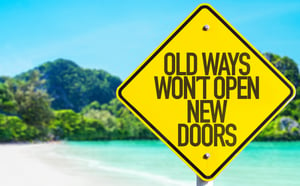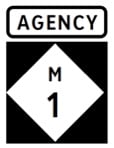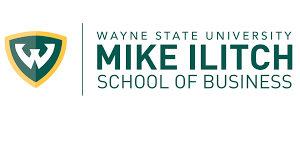Student leaders and their inspiration
Recently, I attended an event hosted by the Detroit HubSpot Users Group and Inbound 281 where Brian Halligan, the co-founder and CEO of HubSpot, explained the pivotal points his company faced with the economic shutdown. The abrupt halt, which ushered in the digital transformation still unfolding in every industry with the global pandemic, had a significant effect on his business customers and consumers alike. As Mr. Halligan described the motivation to evaluate, accelerate, and innovate HubSpot’s business model while maintaining the customer centric experience; his words were thoughtful and precise, “Don’t waste the crisis.”
 For this non-traditional, under-graduate and graduate university student about to finish a dual undergraduate while beginning a master’s degree, those words hit home. The intensity of this economy is similar to the industrial age and the success rate for a career in my degree field is fraught with unknowns. Plus, I and several of my peers, found our scheduled internships abruptly cancelled and the alternatives to gain experiential learning dried up quickly. The economic and social disruptions were, and are, comprehensive. Some of my peers’ instincts were dual focused; wait out the storm and things will go back to normal. Others expressed urgency as business valuations would be lower and presented an opportunity for investments and innovation. Eight months later and a deep dive into the resources available through university career centers have proven there are similarities to the current transformation into a digital economy with the historical references of the automotive industry and the buggy whip makers. Universities and their ancillary services are at a crossroads with the digital economic transformation and the way things have always been done. The similarity is not lost on me and my peers: the last one to accept the change will be left behind.
For this non-traditional, under-graduate and graduate university student about to finish a dual undergraduate while beginning a master’s degree, those words hit home. The intensity of this economy is similar to the industrial age and the success rate for a career in my degree field is fraught with unknowns. Plus, I and several of my peers, found our scheduled internships abruptly cancelled and the alternatives to gain experiential learning dried up quickly. The economic and social disruptions were, and are, comprehensive. Some of my peers’ instincts were dual focused; wait out the storm and things will go back to normal. Others expressed urgency as business valuations would be lower and presented an opportunity for investments and innovation. Eight months later and a deep dive into the resources available through university career centers have proven there are similarities to the current transformation into a digital economy with the historical references of the automotive industry and the buggy whip makers. Universities and their ancillary services are at a crossroads with the digital economic transformation and the way things have always been done. The similarity is not lost on me and my peers: the last one to accept the change will be left behind.
Fortunately for me and my cohorts at Wayne State University at the Mike Ilitch School of Business, there are positives and a plan, albeit developed pre-COVID, to assess, adapt, and overcome. Unfortunately, the accepted pace of change in university academia may be the obstacle that needs to be cleared more so than the effects of a pandemic on the economy.
Student Success Through Engagement with WSU Alumni and the Business Community
The Mike Ilitch School of Business (MISB) adopted a Strategic Plan in September 2019. This plan created and revised the existing goals from the 2013-2018 plan and identifies several key areas. Three of those key areas are student success, engagement with the business community, and connect students with alumni. The measurable goals and timelines were set prior to the disruption of COVID-19; however, the insights and goals identified are still relevant and vital to ensure positive outcomes. Even more, the students positioned to enter the job market post COVID-19 rely on the ability of the MISB administration to assess, adapt, and overcome the traditional and accepted glacial pace of progress in university academia. Unfortunately, students ready to graduate do not have luxury afforded to the administration, to “wait and see.” In addition, the services available through the career centers offers the same approach to networking, job searches, and career opportunities as done prior to COVID-19, but in an online conversation. This approach leaves the rising juniors, seniors, and graduates to wait out the storm or left behind to land a position within their degree field. There are businesses and organizations embracing the transition by viewing the disruption as the chance to innovate and grow. However, modifying a traditional career events to a virtual format for students and recruiters misses the mark for the both sides to determine if the connection is a value add to a changing business and not a value fit.

With slow progress, additional steps, and limited access for companies and students to connect through the traditional career center; agile companies and students are utilizing LinkedIn, GitHub, and other professional social media platforms to flush out opportunities and keep pace with the organizations making immediate changes to their recruiting efforts. Networking has bypassed the career center and is an open and free exchange among students and recruiters through these methods. Micro credentials and industry certifications are available, and are often free, through HubSpot, Google Learn, Google Digital Garage, LinkedIn, Code Academy, and more. Learning for free or for far less of the cost of a university course with curriculum developed and paced for a pre-COVID world, Wayne State University and the Mike Ilitch School of Business has a unique opportunity to prove their leadership and adapt to the changes to overcome these obstacles. Enter, Agency M-1.
How to Go From Here to There
 The student-centric, digital consulting group, Agency M-1, is the first of its kind in the Detroit metro area and at Wayne State University. The three-phase plan of Agency M-1 is designed to bring students, curriculum, businesses, and career opportunities together, and was launched in September 2020 to bring about change and a three phase plan.
The student-centric, digital consulting group, Agency M-1, is the first of its kind in the Detroit metro area and at Wayne State University. The three-phase plan of Agency M-1 is designed to bring students, curriculum, businesses, and career opportunities together, and was launched in September 2020 to bring about change and a three phase plan.
- Phase One: Offer the collaborative software shared by HubSpot to the student organizations, build an online presence with a website and webpages with interactive elements and engaging content has event calendars filling up quickly. Several student organizations at the MISB are leading by example to prove working together in the digital economy can assess, adapt, and overcome with the same KPIs from the Strategic Plan of 2019 and on a zero budget.
- Phase Two: Target the small- to mid-market organizations owned by women and minorities to connect the District of Detroit’s businesses with Detroit’s business school for internships, co-ops, and service-learning opportunities. Businesses can raise their competitive advantage by expanding their understanding of the newest technology and Agency M-1 can bring the students to apply these state-of-the-art technologies and inbound customer engagement to the businesses. The constraints on a small business to gain access to the technology can be cleared through the cooperation with the students who study the technology, inbound skilled talent and desire a chance to put it into practice. Micro credentials, along with innovative and active learning through projects, will add value for the students and the courses across the business disciplines.
- Phase Three: Agency M-1 and the Mike Ilitch School of Business can offer executive education with leading educators and industry professionals to small businesses, entrepreneurs, and innovators.
 Consumers are informing themselves now more than ever. Through online resources, businesses should be capitalizing on the consumer desire to inform themselves with relevant content and personalized interactions. By sharing information and creating engaging content marketing and social media, search engine optimizations will grow a business by having content that is useful for all customers. Students can create the useful content in these areas, develop the website to host it, and monitor the progress by applying their training in analytics and business intelligence to bring search engine optimization to the mom-and-pop business that otherwise might not be able to reach their customers.
Consumers are informing themselves now more than ever. Through online resources, businesses should be capitalizing on the consumer desire to inform themselves with relevant content and personalized interactions. By sharing information and creating engaging content marketing and social media, search engine optimizations will grow a business by having content that is useful for all customers. Students can create the useful content in these areas, develop the website to host it, and monitor the progress by applying their training in analytics and business intelligence to bring search engine optimization to the mom-and-pop business that otherwise might not be able to reach their customers.
The three-phase plan, developed through the cooperation and guidance of the 2020 Education Partner Program cohorts with HubSpot, is sought after by businesses, professionals in the digital economy, students, alumni—and is needed now, right now. The University of New Hampshire with Digital Z and Northeastern University with Husky Communications have been willing to share their insights with the Mike Ilitch School of Business. Agency M-1 and Prof. John Heinrichs are working toward the goals of the plan mentioned above and are making connections where it matters most: students and curriculum, businesses, and WSU alumni.
Responsibility and Accountability
The dismantling of long-standing practices is going to happen, it’s just a matter of time. As the stakeholders recognize so much can be gained, the business community of Detroit, Michigan and the business students have chosen to put their money and education into practice. Again, the university status quo could prove to be the inflexible obstacle more restrictive than the economic halt. Further underpinning the situation, the rate of change inside academia is vastly different from the rate of change in the business community, and students realize the symptoms and recognize the problem.
“We have long believed that when the rate of change inside an institution becomes slower than the rate of change outside, the end is in sight. The only question is when," by Jack Welch.
Supporting the student led organizations, like Agency M-1, as accountability partners and innovators on one side of the aisle, and with the MISB faculty and administration on the other, the alliance can achieve the goals of Agency M-1 and the Strategic Plan of 2019. The fact is the crisis is going to provide valuable lessons and the disruption viewed as an opportunity for innovation and adaptation. Now is a time to dismantle the status quo, hierarchy, and timelines of how progress was, or is, always done in university academia. For the students, graduates, alumni, and business owners of Detroit, Michigan… “Let’s not waste the crisis.”

